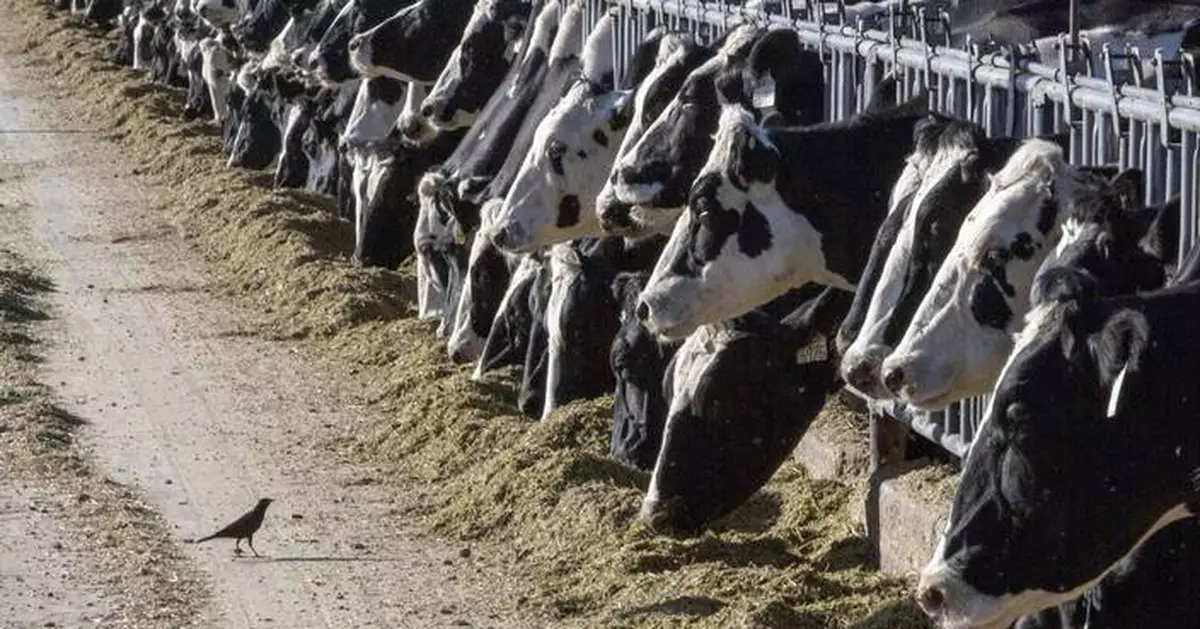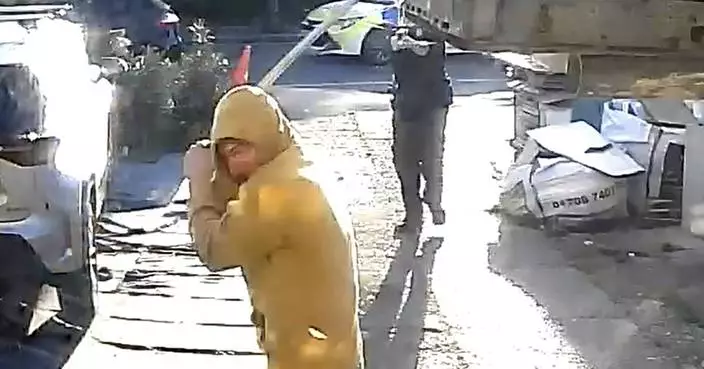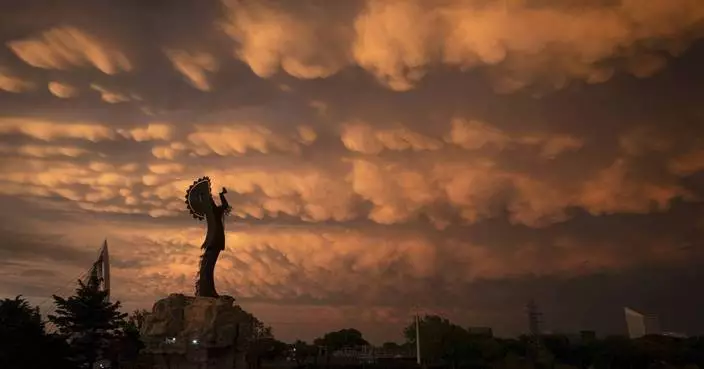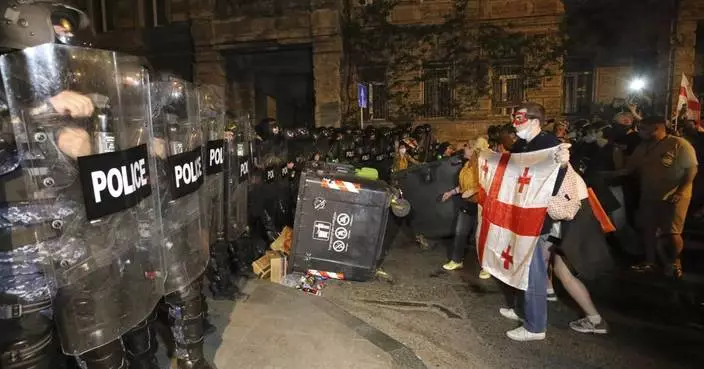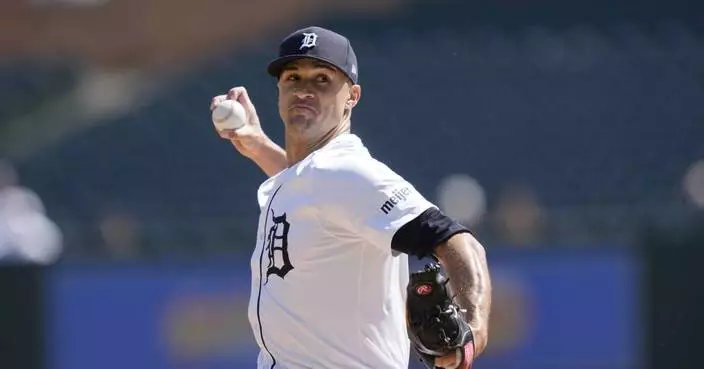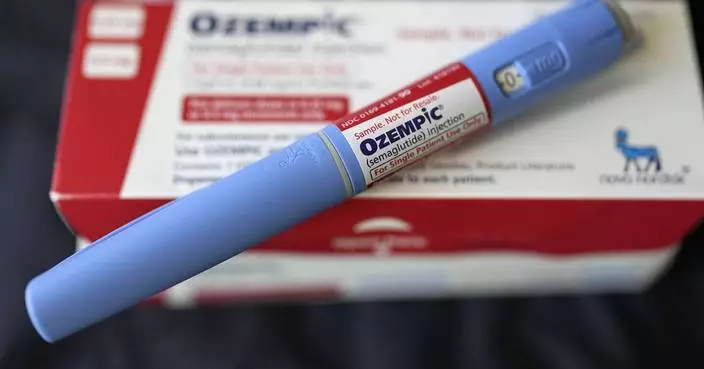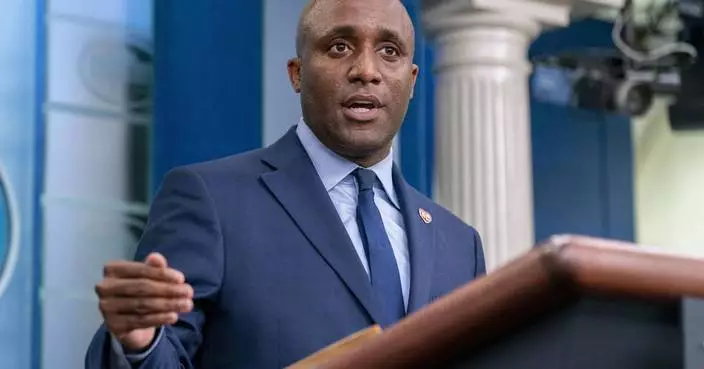Milk from dairy cows in Texas and Kansas has tested positive for bird flu, U.S. officials said Monday.
Officials with the Texas Animal Health Commission confirmed the flu virus is the Type A H5N1 strain, known for decades to cause outbreaks in birds and to occasionally infect people. The virus is affecting older dairy cows in those states and in New Mexico, causing decreased lactation and low appetite.
It comes a week after officials in Minnesota announced that goats on a farm where there had been an outbreak of bird flu among poultry were diagnosed with the virus. It's believed to be the first time bird flu — also known as highly pathogenic avian influenza — was found in U.S. livestock.
The commercial milk supply is safe and risk to people is low, according to the U.S. Department of Agriculture. Dairies are required to only allow milk from healthy animals to enter the food supply, and milk from the sick animals is being diverted or destroyed. Pasteurization also kills viruses and other bacteria, and the process is required for milk sold through interstate commerce, the agency said.

Dairy cattle in Texas and Kansas test positive for bird flu
“At this stage, there is no concern about the safety of the commercial milk supply or that this circumstance poses a risk to consumer health,” the USDA said in a statement.
The federal government said its tests in the cattle did not detect any changes to the virus that would make it spread more easily to people.
Dairy farmers in Texas first became concerned three weeks ago when cattle started falling ill with what officials called “mystery dairy cow disease," Texas Department of Agriculture Commissioner Sid Miller said. Milk production fell sharply and the cows were lethargic and weren't eating much.
“We hadn't seen anything like it before,” he said. “It was kind of like they had a cold.”
The state's animal health commission began an investigation that included tests for bird flu, spokeswoman Erin Robinson said. Based on findings from Texas, USDA officials think the cows got the virus from infected wild birds.
Experts say livestock appear to recover on their own within seven to 10 days. That's different than bird flu outbreaks in poultry, which necessitate killing flocks to get rid of the virus. Since 2022, outbreaks have affected about 82 million wild and commercial birds in the U.S.

Dairy cattle in Texas and Kansas test positive for bird flu
So far, the virus appears to be infecting about 10% of lactating dairy cows in the affected herds, said Michael Payne, a food animal veterinarian and and biosecurity expert with the University of California-Davis Western Institute for Food Safety and Security.
“This doesn’t look anything like the high-path influenza in bird flocks,” he said.
Bird flu was detected in unpasteurized, clinical samples of milk from sick cattle collected from two dairy farms in Kansas and one in Texas. The virus was also found in a nose and throat swab from another dairy in Texas.
Officials called it a rapidly evolving situation. The Food and Drug Administration and Centers for Disease Control and Prevention are involved, along with officials in the three states. Another dairy-heavy state, Iowa, said it is monitoring the situation.
Dairy industry officials said that producers have started enhanced biosecurity efforts on U.S. farms, including limiting the amount of traffic into and out of properties and restricting visits to employees and essential personnel.
Bird flu previously has been reported in 48 different mammal species, Payne noted, adding: “It was probably only a matter of time before avian influenza made its way to ruminants.”
The Associated Press Health and Science Department receives support from the Howard Hughes Medical Institute’s Science and Educational Media Group. The AP is solely responsible for all content.

FILE - Dairy cattle feed at a farm on March 31, 2017, near Vado, N.M. The U.S. Department of Agriculture said Monday, March 25, 2024, that milk from dairy cows in Texas and Kansas has tested positive for bird flu. (AP Photo/Rodrigo Abd, File)
TOPEKA, Kan. (AP) — Some Kansas lawmakers see a chance to lure Kansas City's two biggest professional sports teams across the Missouri border. But an effort to help the Super Bowl champion Chiefs and Major League Baseball's Royals finance new stadiums in Kansas fizzed over concerns about how it might look to taxpayers.
Members of the Republican-controlled Legislature pushed a bill Tuesday that would have allowed Kansas officials to authorize at least $1 billion in bonds to cover the entire cost of building each new stadium, paying the debt off with tax revenues generated in the area over 30 years. But GOP leaders didn't bring it up for a vote before lawmakers adjourned their annual session early Wednesday.
Some critics derided the plan as corporate welfare. Others were receptive but didn't want to pass the proposal until the Legislature approved a broad package of tax cuts for their constituents that Democratic Gov. Laura Kelly would sign — which didn't happen either.
Legislators' work on a plan began in earnest behind the scenes after voters on the Missouri side of the Kansas City metropolitan area decisively refused earlier this month to extend a local sales tax used to keep up the complex housing the Chiefs' Arrowhead Stadium and the Royals' Kauffman Stadium for more than 50 years.
The bill's biggest champion, Kansas House Commerce Committee Chair Sean Tarwater, a Kansas City-area Republican, said supporters want to give the two professional sports teams another option should they contemplate leaving Kansas City, which he said would be devastating to both states.
“You miss 100% of the shots you don’t take,” Tarwater said. “We need them to stay in the metroplex.”
The idea isn't dead yet.
Kelly and her staff signaled Tuesday that she is likely to veto the last tax package lawmakers approved, cutting income, sales and property taxes by a total of almost $1.5 billion over the next three years. Lawmakers expect Kelly to call a special session of the Legislature to try to get lawmakers to pass a tax plan that she'll accept — and they could consider the stadium financing proposal then.
“We just need a little time on it — we’ll be OK," said Senate President Ty Masterson, a Wichita Republican. "I mean, we’re serious about trying to incentivize the Chiefs to come our direction.”
Missouri Gov. Mike Parson told KSHB-TV in Kansas City on Tuesday that his administration would do everything that it can to keep the Chiefs and Royals in Missouri. His state's lawmakers are in session through May 17.
"We got time to try to work on some ways to try to see what we can do to help with keeping them here, and that’s our main goal,” Parson said.
The Kansas proposal would allow the bonds to finance 100% of the construction of each of two new professional sports stadiums with at least 30,000 seats. State and local officials would have a year to sign off, and the teams would be on the hook if local tax revenues weren't enough to pay off the bonds.
“It was just a concern of running it before we gave real tax relief to our constituents — kind of that juxtaposed look of what appears to be corporate welfare before you’re getting tax relief to the people,” Masterson said after deciding against having a Senate vote.
Before the local sales tax vote in Missouri, the Chiefs wanted to use their share of the revenues to help pay for an $800 million renovation of Arrowhead. The Royals planned to use their share to help finance a new, $2 billion-plus ballpark district that would be part of a larger nationwide wave of sports construction.
The current lease lease on the two teams' complex lasts through Jan. 31, 2031. Royals owner John Sherman has said the Royals will not play at Kauffman Stadium beyond the 2030 season, the Chiefs are hopeful of remaining at Arrowhead Stadium.
“We’ll be in a situation where we go back to the drawing board,” Chiefs owner Clark Hunt told reporters last week. “I do feel very much a sense of urgency, and we will approach it from a broader perspective going forward.”
Backers argue that the Kansas plan is ideal because the money to pay off the bonds would come from new sales and alcohol taxes generated only when the area around each stadium develops. Also, professional players will have to pay income taxes to Kansas on the portion of their earnings made at the stadiums in Kansas.
But Americans for Prosperity-Kansas, a small-government, low-tax group that has long opposed the use of such bonds, also opposed the stadium financing proposal. The group is influential with Republicans and told lawmakers it would consider their votes in evaluating their records.
Critics have long argued that allowing the bonds to finance big projects represents the state picking economic winners and losers instead of the free market. The same kind of bonds have financed multiple projects, including NASCAR's Kansas Speedway in Kansas City, Kansas.
One northeastern Kansas lawmaker, Democratic Sen. Tom Holland, called the stadium proposal “economic development for millionaires.” He added that it’s “total foolishness” to have taxpayers subsidize the stadiums — either through taxes they pay when they visit or because the state forgoes revenues that would flow into its coffers.
Another northeastern Kansas lawmaker, conservative GOP Sen. Dennis Pyle, said: “We’ve got a lot of priorities in Kansas, and I’m not sure that’s one of them."
Other lawmakers were critical because the Legislature had no public hearings or debates before three senators and three House members met in public this week to hash out the details of the proposal.
“As much as I would love to see the Chiefs and the Royals both come to Kansas, this is a very large expenditure of tax money that merits careful consideration, not a last minute scheme,” said Democratic state Rep. John Carmichael, of Wichita.
Skretta reported from Kansas City, Missouri.

Kansas Senate President Ty Masterson, right, R-Andover, speaks during a news conference with other Republican leaders, with House Speaker Dan Hawkins, left, R-Wichita, watching, following the Legislature's adjournment of its annual session, Wednesday, May 1, 2024, at the Statehouse in Topeka, Kan. Some lawmakers hope to lure the Kansas City Chiefs and Kansas City Royals to Kansas with a plan to help them finance new stadiums. (AP Photo/John Hanna)

Kansas Senate President Ty Masterson, right, R-Andover, confers with his communications director Mike Pirner during a break in the Senate's session, Tuesday, April 30, 2024, at the Statehouse in Topeka, Kan. Lawmakers have adjourned their annual session without voting on a proposal to help the Kansas City Chiefs and Kansas City Royals finance new stadiums in Kansas. (AP Photo/John Hanna)

Kansas Senate President Ty Masterson attends a news conference with other Republican legislative leaders, Wednesday, May 1, 2024, at the Statehouse in Topeka, Kan. Masterson didn't bring a proposal to help the Kansas City Chiefs and Kansas City Royals finance new stadiums in Kansas because of the opposition the idea faced. (AP Photo/John Hanna)

Kansas Senate Commerce Committee Chair Renee Erickson, left, R-Wichita, confers with House Commerce Committee Chair Sean Tarwater, right, R-Stilwell, during a break in the Senate's session, Tuesday, April 30, 2024, at the Statehouse in Topeka, Kan. The two lawmakers have helped draft a proposal designed to assist the Kansas City Chiefs football team and the Kansas City Royals baseballs team finance new stadiums in Kansas. (AP Photo/John Hanna)

FILE - Clouds gather over Kauffman Stadium before a baseball game between the Kansas City Royals and the Cleveland Indians, on June 4, 2017, in Kansas City, Mo. Some Kansas lawmakers see a chance to lure Kansas City's two biggest professional sports teams across the Missouri border, but an effort to help the Super Bowl champion Chiefs and Major League Baseball's Royals finance new stadiums in Kansas fizzed over concerns about how it might look to taxpayers. (AP Photo/Charlie Riedel, File)
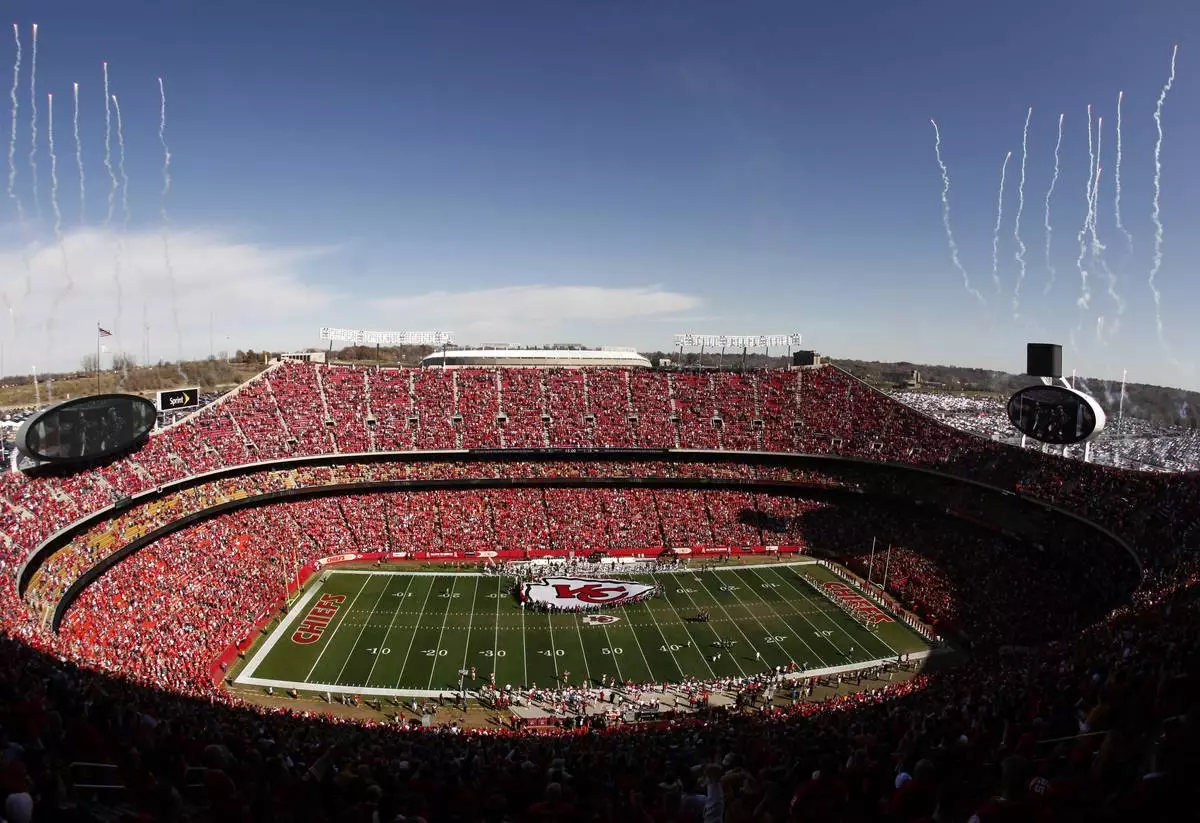
FILE- Fans fill Arrowhead Stadium as fireworks go off before an NFL football game between the Kansas City Chiefs and the Denver Broncos on Nov. 13, 2011, in Kansas City, Mo. Some Kansas lawmakers see a chance to lure Kansas City's two biggest professional sports teams across the Missouri border, but an effort to help the Super Bowl champion Chiefs and Major League Baseball's Royals finance new stadiums in Kansas fizzed over concerns about how it might look to taxpayers. (AP Photo/Charlie Riedel, File)





